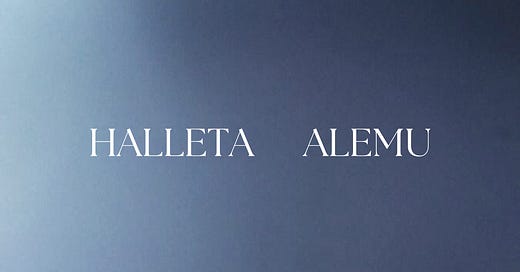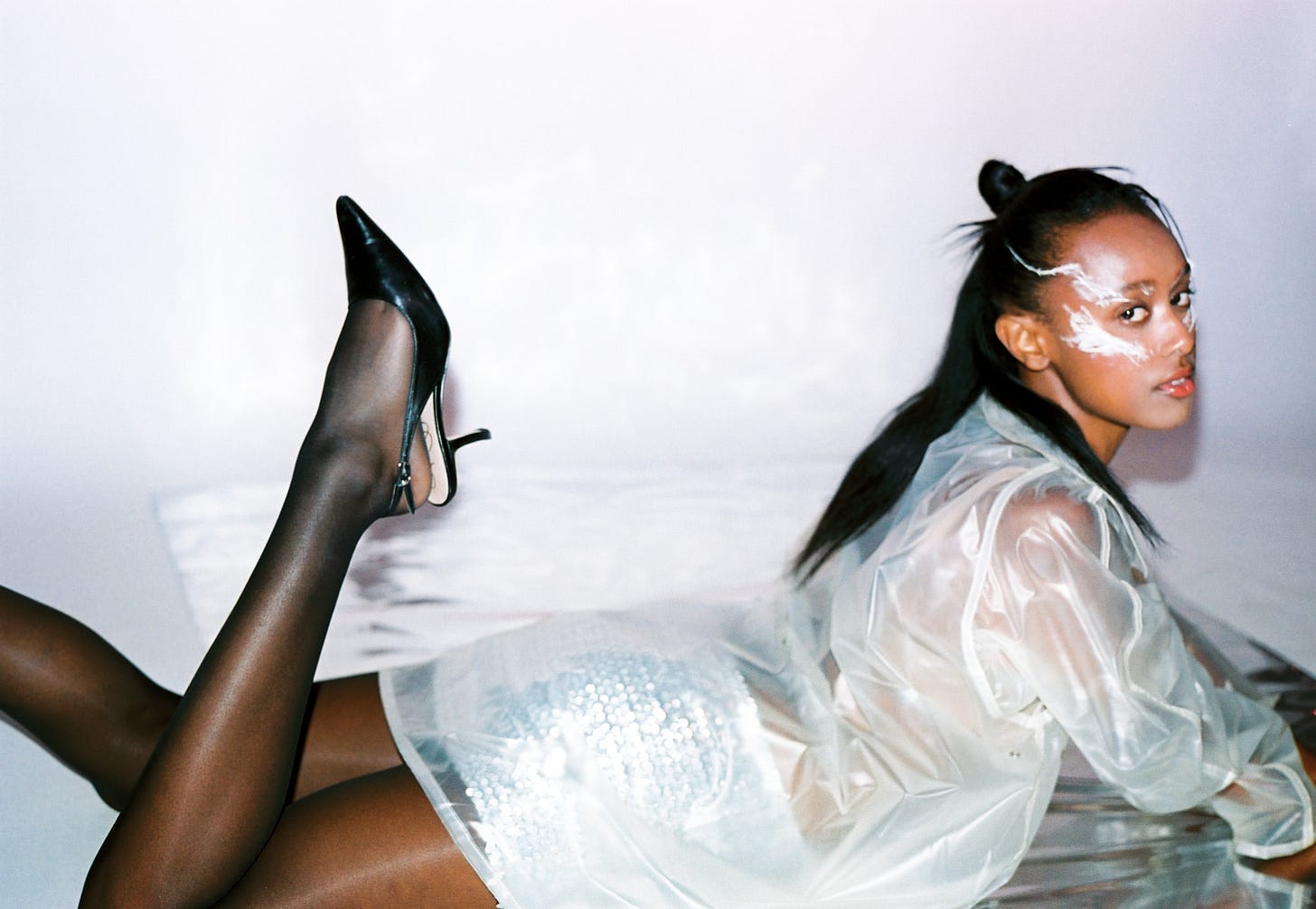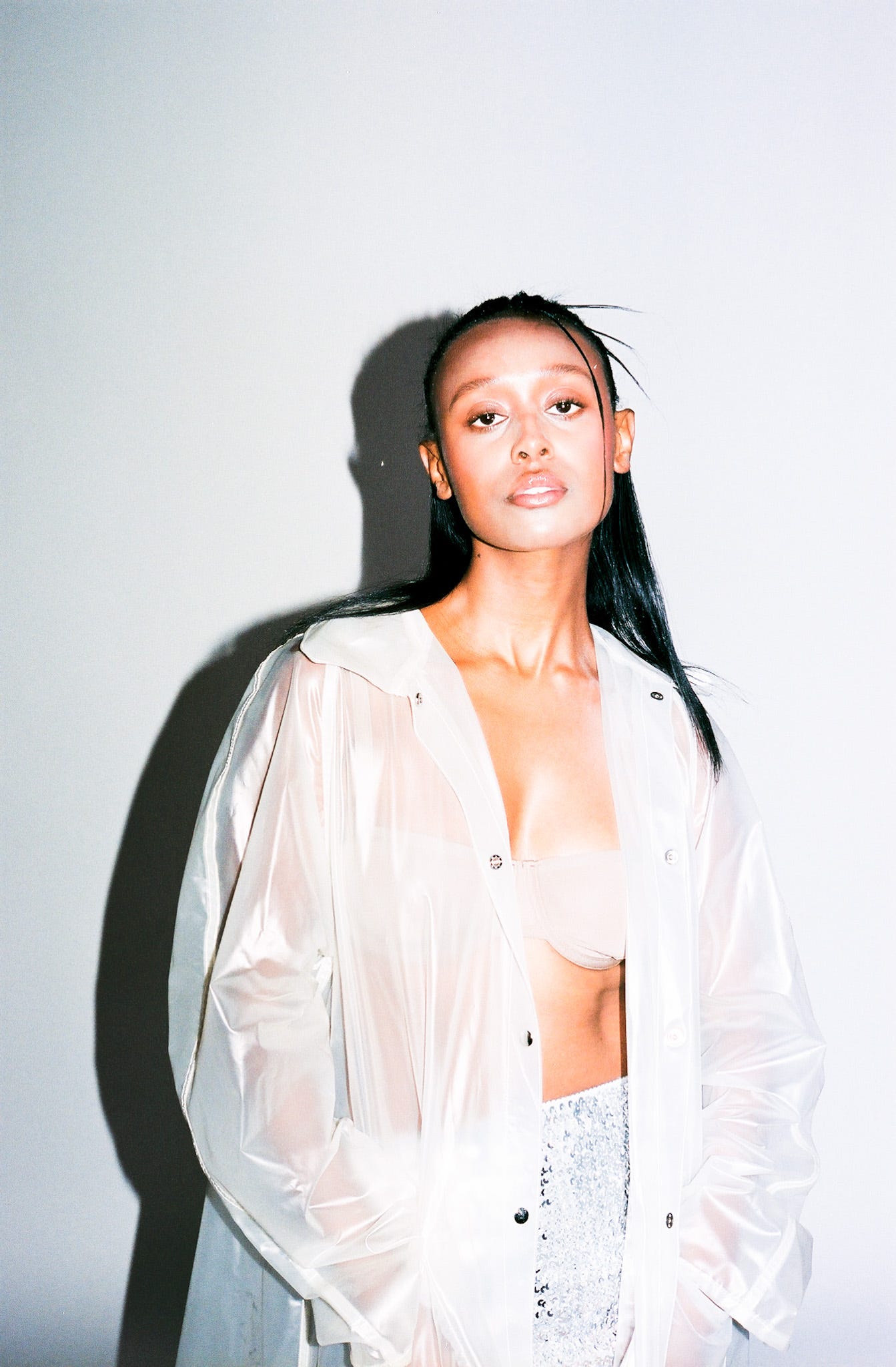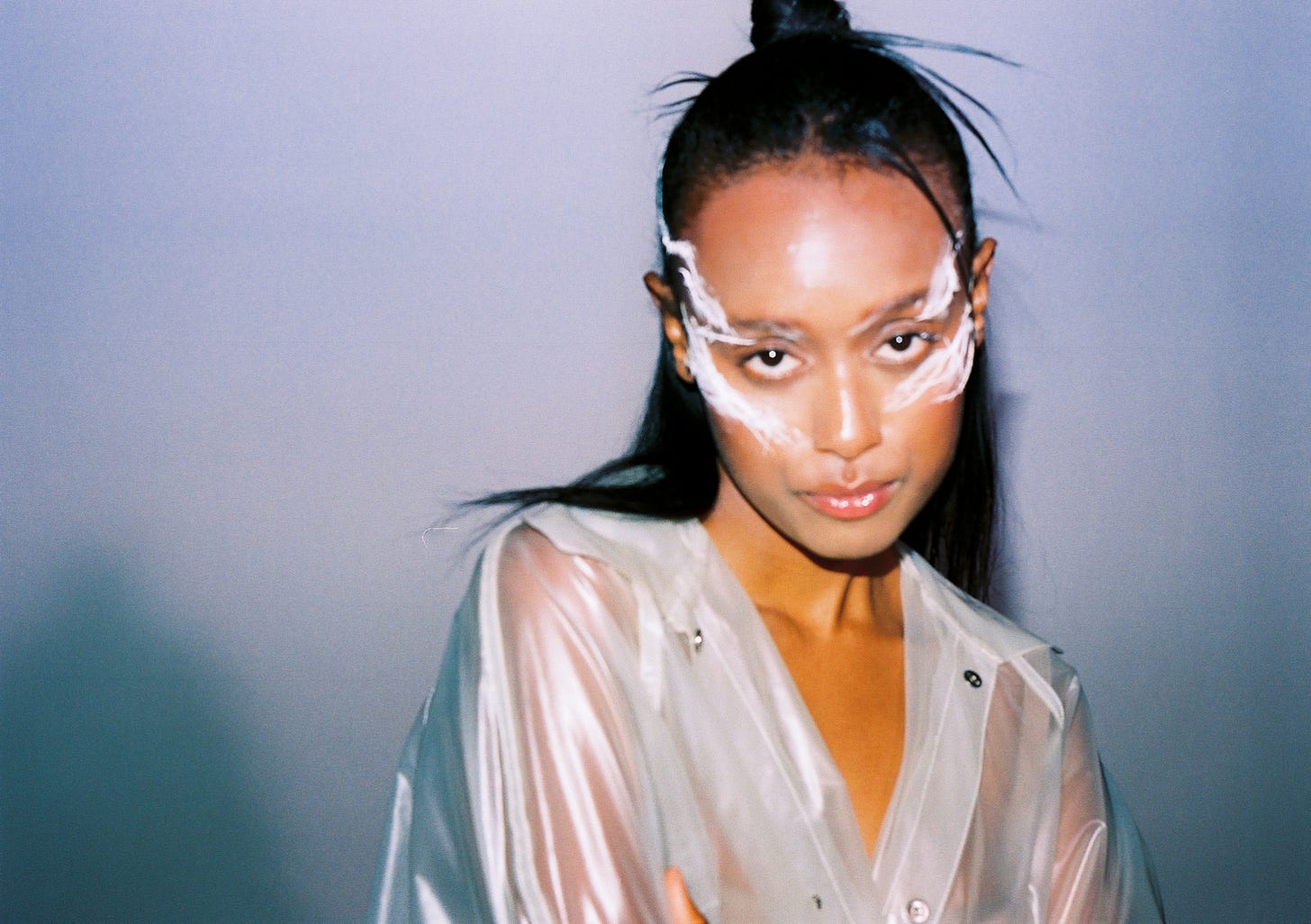Halleta Alemu is reshaping what it means to create by exploring her work through every medium she can. From film to music to writing, her work reflects that journey. She talks about her shift from acting to writing, her evolving dreams, the sources that inspire her, and the process behind her elusive project tentatively titled The Mercury Project.
This interview has been edited for length and clarity.
Featured Images: Halleta Alemu
Where has your attention been these days, and what medium of art are you focused on right now?
Honestly, my attention is all over the place right now, and I’m trying to honor that. I love film, I love music, I love text, I love visuals—and I’m realizing that only writing isn’t enough for me. Even though writing is where I feel the most free and expressive, it’s not the whole picture.
Just staring at a piece of paper or my computer screen every day isn’t how my creativity works. I need to see something, hear something, feel something with my senses, and then download it. Writing feels like the last part of the process. I’m working on a book—well, I’m calling it a project, because if I call it a book, I suddenly don’t want to do it. It doesn’t start with a blank page. I’m more focused on what I experience in the world first. Even if I’m writing fiction, it’s always rooted in some truth I’ve lived through.
What objects or tools do you surround yourself with to channel creative energy?
I love the word "channel." That’s exactly what it is—getting yourself into a state to receive, to flow. Not just flow, but this electric state where everything feels charged. For me, electricity feels like I’m in a highly energized flow state. I’m influenced by music and colors, but lately, I’ve been going on long walks without my phone or a destination in mind. That alone puts me in this space where I want to write, and I always carry my journal with me.
There’s so much pressure everywhere, and it’s not even self-inflicted—it’s just in the air. Like, you’ve got to do this, you’ve got to monetize that. It’s overwhelming. But sometimes I just want to be in contact with the thing itself, without all that noise. That’s why I love leaving my phone behind. It’s just me and the world, and we communicate. It’s not about other people, it’s about me being in contact with the world.
How do you feel after the walk?
I usually crave something fresh and healthy—like juice. Whether it’s orange juice, a really good smoothie, or just a piece of fruit, I want something that feels connected to the earth. Or I’ll feel like cooking for myself, which is rare because I don’t always want to cook. But after the walk, I want to take care of myself in some way.
You mentioned something really interesting about what inspires you. Music is one source, but I’d love to hear you dive into colors. What do they mean to you?
I don’t think I’ve always been so attached to color. It just kind of happened. Honestly, it started the moment I realized I was a writer too. It was 2017, and I was going through a tough time. I was deep into auditioning as an actress and juggling a bunch of part-time jobs. I’ve written a lot about that era, but I was really depressed. I remember sitting in audition rooms and starting to notice the color red—a bright, cherry, electric red. While waiting in those rooms, I kept asking myself, "What’s the bravest, wildest, most brash color?" For me, it’s red. Red is power.
I started noticing it more and wearing it more, and it made me happy. When I wrote about it, suddenly, it was all I could see. Musicians I loved started using it in their album covers, and it made the music feel even bigger to me. I was like, whoa.
Then, in a funny way, it transitioned to blue. I remember this Off-White Virgil Abloh runway, and Bella Hadid came down in this electric blue strapless dress with matching boots. It hit me like, I’ve never really seen that color before. After that, I kept seeing it everywhere. Even now, I just made eye contact with something blue in my room. It made me feel so good, and I realized I needed that color around me. That was around 2019, 2020—when I fully grasped how much I loved it. I couldn't believe I hadn’t noticed it before. This electric blue was just... out of control. It’s a color that matches its intensity both on-screen and in real life.
Then, there’s hot pink. I’ve always loved pink—it’s always been my favorite color. But when I started getting into these more intense, almost violent shades of fuchsia, I thought, whoa, this is dangerous. It’s girlhood taken to the extreme. And that’s the kind of story I want to tell—it reflects how I feel as a person. I might look a certain way, but inside, I have these intense, volatile emotions. It comes out in my writing, the music I gravitate toward, and the art I love. It’s not like, “Oh my God, you guys don’t understand me because I’m a girl,” but more like, when people meet me and get to know me, it’s different from what they expected. It’s the same with my writing. The expectations versus what I actually want to do—it’s that contrast.
So I love the idea of using a color like hot pink, which is so bright and bold but also carries a kind of intensity. I want people to think of that when they think of me, like the breadth and depth of that color. To me, color is one of the most powerful things—it’s infinite. It’s a spectrum, a frequency, and if you’re a color, you encompass everything. It’s uncontrolled, free, and limitless.
Take me back to the moment when you decided to pursue writing instead of acting. What was happening both around you and within you at the time?
It was a long process of letting go. I wanted to be an actress because I loved the idea of it—the way it looked and the thought of achieving a great amount of fame that’s connected to art. I have no interest in fame that’s not attached to art, it’s just not that interesting to me. But acting wasn’t my most natural form of expression. I learned how to do it, but I always felt like I was forcing my personality to turn the other way.
For me, my emotions come out easiest on the page. But acting and writing needed each other. I had to learn how to act because it unlocked compartments inside me that I didn’t know were there—compartments that I now use in my writing. Writing is an embodied practice. I say that for myself, but I believe it's true for everyone. It comes from deep inside—inside your body, inside your emotions. When you open up and become more expressive in life, even through something like acting, it allows you to access deeper layers of emotion and expression. Acting classes helped me do that. They forced me to become more vulnerable and expressive in real life, which then translated into an even greater need to express myself through writing.
Before COVID hit, I had been struggling with acting and wasn’t making a living. I was also doing entertainment hosting and interviewing, which paid the bills but wasn’t fulfilling. Then in 2020, I thought, "Okay, maybe I'll lean fully into hosting," but during the pandemic, all my jobs disappeared. Some auditions were still coming but with writing, I didn’t know what I wanted to do yet.
During that time, I was living with my aunt, and it was like being a kid again—just me, alone with my imagination. I’d always been an only child, so I knew how to entertain myself, explore my mind, and create entire worlds. That time made me realize I had been placing too much emphasis on acting. I started a project during the pandemic, blending my poetic writing into a short film, which felt like a revelation. I worked with a director on Zoom; she was in London, and I was in LA. It was a really cool experience to use my own words instead of saying someone else's.
That’s when I knew—acting is not a career for me. Acting is something in my toolbelt I’ll express through my work. Writing is the thing that truly gives me the gravitas I’ve been wanting. In 2021, I officially let go of my acting representation and decided to fully lean into writing. But it has to be on my terms—my work, my voice. I don't want to be a copywriter or just write to make money for someone else. Writing came into my life for a reason, and I believe it’s meant to be for me, not for anyone else.
Many creatives may feel the pressure to be everything at once—a writer, poet, musician, artist. What advice would you give to those who hesitate to embrace their multitudes?
I would say that it’s going to be a process. Even today, I’ve been thinking a lot about how my work is like a lifelong process, and there’s no rush. I think I’ve been putting a lot of stress on myself, trying to get things done in this decade of my life. But then I remind myself—this is a lifelong journey, a lifelong exploration.
I saw this really beautiful handwritten note on Twitter. Someone shared a message from their 91-year-old grandmother, and it said something like, “The weather outside is cool and chilly, and it’s August, and I don’t have any regrets about the way my life has gone.” Just seeing her handwriting and that simple, but robust and poetic thought made me think, “Oh my God, we’re never not becoming. We’re never finished exploring ourselves. We’re never done with this journey.”
I think so much of youth is wrapped up in diaries, journaling, and finding out who you are through new experiences. But we totally forget that this process never stops. Our mothers, our fathers, our grandparents, everyone—no matter how old they are—are always feeling this way. It’s a constant evolution. There’s never a moment where we say, “I’ve arrived, and I’ve grown up.” We’re like children even at 100 years old because that’s new. We’re always experiencing something new.
That realization gave me a kind of grace for myself, an endless observation that I don’t need to rush or perfect anything. This is a constant process of learning who I am. I think that’s the key: it’s an act of noticing yourself because other people will have their multi-hyphenate careers that look so polished and make a lot of sense and so put together, and you wonder, “How did they do that? It all makes so much sense!” But at one point, that career didn’t make sense for them. So you can create exactly the lane you’re meant to be on, and that’s what you’re supposed to do.
So, my advice to others would be: follow the weird little pings that resonate with you, because they actually intersect. For me, I love writing, but I do not align with so much of what’s attached to being a writer. I don’t want to sit by a cozy fireplace with a cup of tea, being away from the world. That’s my nightmare! I want to be in the world—I want really loud music, bright lights around me, and people around me.
Then I think about the stories I want to tell, and suddenly, all this shit makes sense. That’s also why I don’t want to just write a book. Yes, I can put all of my experiences into a book, but my work is meant to be expressed in so many different ways.
So, allow yourself to be surprised. Don’t try to put logic in the conversation of what you’re interested in. It’s just pure intuition because it’s going to feel so good when you let yourself be exactly who you are.
Also, people always say this, but it’s true: pay attention to the things you loved as a child. Yesterday, I remembered a moment from when I was about six or eight years old. I saw these two girls in their twenties at the mall, both with short bobs—one had bright pink hair, and the other had bright blue. I was struck. As a child, I thought, "These are the most beautiful colors I’ve ever seen. I can’t believe that can be hair!"
Fast forward to now, and my two favorite colors are pink and blue. It’s all connected. We were so spongy as children, absorbing everything. I just think that the feelings we had as kids are still with us, and they’re guiding us now.
In your book, ‘It Will Start With a Feeling,’ your reflections are often tied to physical spaces. How has living in LA shaped you as an artist?'
I mean, LA is such an enigmatic place. I've had so many different relationships with this city, so many dreams I've projected onto it, hoping it would give something back. It’s almost like a genie. LA is big, but it feels disjointed. There’s so much room to drift into daydreams, and it’s easy to feel a bit lost here, but not in a way that feels chaotic—it’s almost like a coddled kind of lostness.
I love LA, but it makes me feel like I'm in a transient state. I don’t always feel like I can accomplish as much as I want to. In other cities, I respond better to more compact environments, where the energy of people around me helps me individualize myself. Here, though, I don’t quite know where I fit. But LA becomes exactly what you want it to be—it’s like a mirage. You have to put something into it, otherwise you’ll just wander through the fog, getting pulled into things that turn out to be a waste of time.
There are so many things here that seem amazing from a distance, but as you get closer, you realize it’s just like "The Wizard of Oz"—it’s an illusion, just a guy pulling levers behind a curtain. Hollywood itself is built on illusion. People come here expecting magic, but they find out that it’s just a wooden sign on a hill or that Hollywood Boulevard is actually kind of gross.
So being in this very illusory place, you can’t rely on what others tell you to chase after. You have to focus on your own dreams, the things inside you that feel true, and see if you can find them in the fog. I think that’s how this city works best—when you follow your own strange, personal dreams. And there's a lot of room to play. There are a lot of interesting people, in the corners and crevices of the city. But nothing is going to be handed to you on a platter. You have to go on a journey here, which I think helps me.
I think it's the only place I could have really discovered who I was. I think it’s informed my writing so much, making me write in a way that feels like an endless discovery, with long, lyrical sentences, and the earth here is so beautiful. I don’t know—it just feels like there’s a lot of room to not know, but also a lot of room to discover.
But if you come to LA and fall for the illusions, you’ll be punished for it. The city will punish you. Something true has to be inside of you for something real to happen here. For some people, that’s fame—they want it so badly that it actually happens. But for others, they fall for the illusion of something, whether it’s fame or even being a writer, and they end up lost in it.
In your 2021 Substack essay titled, ‘I Want You To Quit’, you said: “You have to update your dreams as you update as a person”. Can you tell me your current dream based on who Halleta is now?
Right now, I think I’m still finding the exact words, but I just want to create a fully realized text—something I can weave into a story and then wring out into every possible medium possible. That’s really what it is: I want to experience this story in every way I can. I want to sing it, dance it, put it on a screen. I almost want it to be a handbook for myself on how to express it. Writing it on the page feels amazing, one of the best feelings in the world, but it doesn’t stop there for me.
The hang-up I've had with completing my next project—besides it being the longest thing I’ve ever done—comes from the idea of selling it to a publisher and it becoming just a book in my hands. That feels like, I don't know, almost a lie. Like, it would be amazing, but it’s not enough. It feels like a disservice. But when I look at it through the lens of it not even being published, I think about it as a pure piece of text that I get to experience in so many ways—that’s it. That’s nice to say out loud. That’s the dream. I want to experience the text in every way possible. And if other people like it, that’s great. I’ve been putting pressure on myself to get everyone on board, but honestly, I just want to do it for me.
. . .
To dive deeper into Halleta’s literary world, you can follow her Substack, Electric Blue, and read her e-book, It Will Start With A Feeling.







